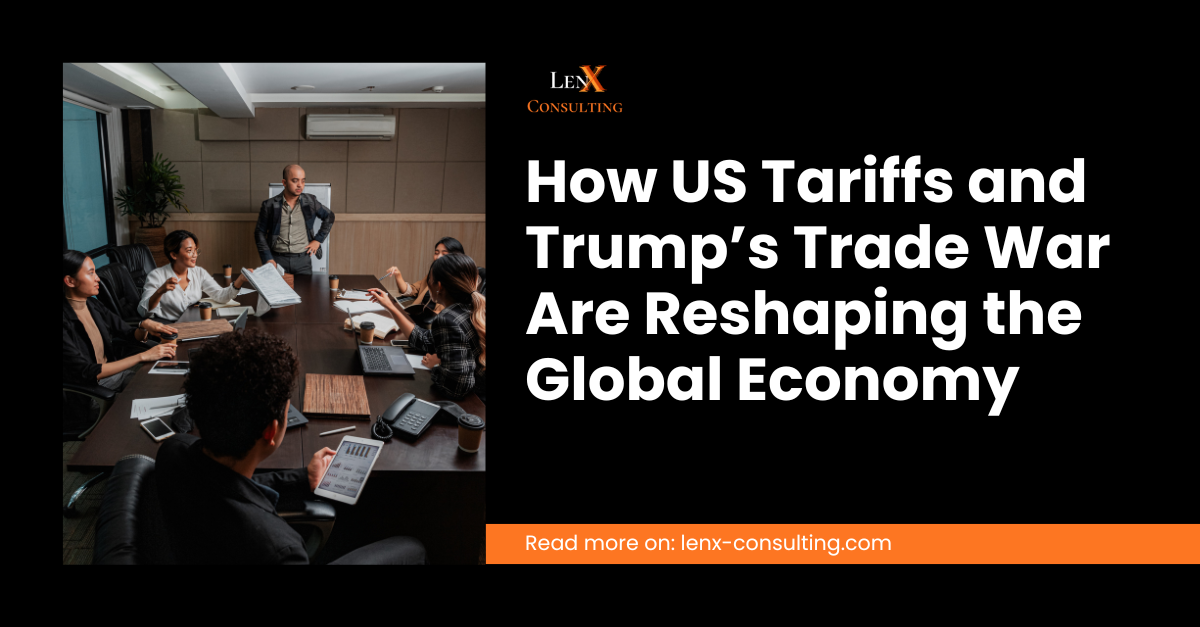US Tariffs Spark Global Trade Realignment
A few weeks ago, I wrote about the UK and the EU seeking stronger ties with Asia following the introduction of new, higher tariffs from the US. Two months on, has this actually happened?
The answer is YES — the US tariffs have prompted major shifts in global trade dynamics, with the UK, EU and Asia adjusting their strategies accordingly.
US Tariffs and Redirection of Trade
The European Central Bank has noted that the US-China trade tensions led to Chinese exports being redirected to the euro area, increasing China’s market share in European imports and this pattern suggests that current tariffs could further strengthen trade ties between the EU and Asia. Additionally, the World Economic Forum highlights that Asian economies are adapting by regionalising their supply chains, moving from global integration to more localised production. This shift could encourage deeper EU-Asia collaboration, particularly in sectors where both regions seek stability amid US trade policies.
Industries Most Affected by Trump’s Tariffs
Some sectors have experienced the most significant ripple effects from US-imposed tariffs:
- Automotive: European carmakers, especially in Germany, France, and Italy, have been hit with 25% tariffs on exports to the US. Some companies are exploring expanding into Asian markets.
- Steel and Aluminum: EU exports now face 25% tariffs, leading suppliers to seek alternative markets, including Asia.
- Pharmaceuticals and Chemicals: Countries like Singapore and Japan, which export high-quality products to the EU, are navigating disruptions caused by Trump’s tariffs on European goods.
Strategic Realignment: EU Looks to Asia
The evolving trade relationship is reflected in key initiatives:
- Diversification away from China: European firms are expanding operations in Vietnam, Indonesia, and Malaysia.
- Green technology & renewables: Partnerships with Vietnam and Malaysia for sustainable production and EVs.
- Semiconductors & AI: Increased collaboration with South Korea and Singapore for electronics and smart tech.
- Natural resources: Strategic alignment with Indonesia to access raw materials vital to the EU’s net-zero goals.
🔗 Read more: Vietnam: The Next China – Why It’s the Perfect Market for Your Brand Expansion
How Companies Are Navigating the EU-Asia Trade Shift
To succeed in a new trade landscape shaped by US tariffs and the broader economic impact of Trump’s policies, companies are employing varied strategies:
- Alliances with local firms: Gain access to regional knowledge, access local networks, share resources and navigate regulatory challenges
- Acquisitions: Fast-track entry with established customer bases
- Subsidiaries and branches: Ensure full control and compliance
- Digital platforms: Enter new markets without physical presence
Examples of Trade Strategy in Action
Here are several notable companies responding to global trade shifts:
- Siemens: Expanding green tech efforts in Southeast Asia, particularly in Vietnam and Malaysia
- Infineon Technologies: Partnering in South Korea and Singapore for semiconductors to meet rising demand for AI and digital technologies
- Zalando: Using digital trade deals with Singapore and South Korea to streamline cross-border e-commerce
- BASF: Working with Indonesia on raw materials for sustainable manufacturing
- Jollibee Foods Corp.: Opened in Milan as part of its European growth
- Alipay: Partnered with Barclaycard to serve Chinese tourists in the UK
- INFINIQ: Establishing European headquarters to expand AI and machine learning solutions
- Doreming: Launched in London, offering cloud-based financial automation for small businesses
- Louis Quartorze and Handsome Co: Entered European department stores
- Juun. J.: Set up a pop-up store in Harrods
🔗 For more on this shift, read: Marketing Asia to Europe: Strategies for Successful Market Entry
Trump’s Tariffs and the Automotive Industry: A Deep Impact
I also wrote about “How the tariffs would impact the automotive industry” in particular. So, I thought it worth reviewing that, too.
What we have witnessed is a disruption in supply chains, increased costs, and shifts in global trade patterns. The 25% tariffs on imported cars and car parts have driven up costs for manufacturers, leading to higher consumer prices and the tariffs have slowed the import of essential components, causing delays in vehicle production and repairs. The increased cost of car parts has led to a projected 10% rise in car insurance rates.
Japanese manufacturers, including Toyota, have seen a 4.8% drop in shipments to the US. South Korean automakers, such as Hyundai and Kia, have suffered a nearly 20% drop in exports to the US, with North American shipments plunging 17.8%. However, while exports to the US have declined, European markets have seen a 26.7% increase in demand for South Korean vehicles.
Insight from the Frontline of Market Entry
For an insight into Asian manufacturers penetrating the UK and EU markets, please read the following, which is an interview between LenX Consulting’s CEO, Cody Lennox and FEST Auto’s Global marketing Director, Alex Akniyaz — How Asian EV Brands Like FEST Auto Are Shaping Europe’s Future.
Relief for UK Luxury Automotive: Trade Deal Update
For luxury brands like Jaguar Land Rover, Rolls-Royce, Bentley, Aston Martin, McLaren, and Morgan in the UK, the US is a crucial market, accounting for 16.9% of total shipments in 2024. However, the recent UK-US trade deal has provided some relief. Tariffs on UK cars were reduced to 10% for the first 100,000 vehicles exported annually and steel tariffs were eliminated.
On the other side of the pond, US-based manufacturers, including Ford, General Motors, and Stellantis, have been impacted by higher costs on imported parts, leading to an estimated $107.7 billion increase in expenses across the industry.
Need Help Navigating These Shifts?
LenX Consulting is your partner in global market expansion, with deep expertise in navigating the complex dynamics between US tariffs, Trump-era trade policies, and emerging Asia opportunities.
Our Services to Support Global Business Growth
- Tailored market entry strategies
- Global brand positioning
- Advanced digital platforms for international growth
- Hands-on support across Europe and Asia
📩 Looking to expand globally or optimize your cross-border strategy? Let’s build your blueprint for success. Contact LenX Consulting today.




